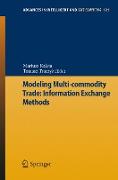- Start
- Modeling Multi-commodity Trade: Information Exchange Methods
Modeling Multi-commodity Trade: Information Exchange Methods
Angebote / Angebote:
Market mechanisms are entering into new fields of economy, in which some constraints of physical world, e.g. Kirchoffs Law in power grid, must be taken into account during trading. On such markets, some of commodities, like telecommunication bandwidth or electrical energy, appear to be non-storable, and must be exchanged in real-time. On the other hand, the markets tend to react at shortest possible time, so an idea to delegate some competency to autonomous software agents is very attractive.Multi-commodity mechanism addresses the aforementioned requirements. Modeling the relationships between the commodities allows to formulate new, more sophisticated models and mechanisms, which reflect decision situations in a better manner.Application of multi-commodity approach requires solving several issues related to data modeling, communication, semantics aspects of communication, reliability, etc. This book answers some of the questions and points out promising paths for implementation and development. Presented solutions are based on Multi-commodity Market Model (M3 ), which enables modeling of rich variety of possible market designs.The book contains revised versions of papers presented during scientific workshop “Modeling Multi-commodity Trade: Information exchange methods", which took place in November 2010 at Warsaw University of Technology.
Folgt in ca. 5 Arbeitstagen
